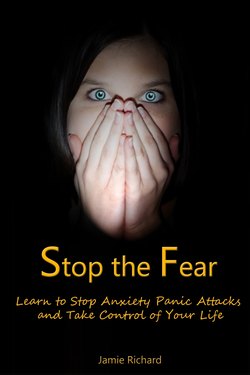Читать книгу Stop the Fear: Learn to Stop Anxiety Panic Attacks and Take Control of Your Life - Jamie JD Richard - Страница 5
На сайте Литреса книга снята с продажи.
Chapter 1: Anxiety Disorders
ОглавлениеWhen anxiety goes beyond just simply anxiety and becomes a daily part of somebodies life that usually means that there is something abnormal going on, such as an anxiety disorder.
Anxiety disorders can, and often do, interfere with a person’s daily life. If can affect their ability to work, their home life, their relationships and can lead to depression.
Once again, if you are feeling depressed or any thoughts of self-harm or suicide, you need to get to a doctor right away.
This book is geared towards helping you manage your anxiety in a variety of ways but some anxiety disorders will still require a physician’s care, especially if you are depressed.
We will be going over the various types of anxiety disorders and their symptoms in this section.
Generalized Anxiety Disorder
People with generalized anxiety disorder have an overwhelming and all-consuming anxiety and worry when there is no physical reason to do so.
They worry excessively over everything in their lives to the point of nearly being obsessed with their worry and fear.
Their fears and anxiety is often over situations that are unlikely to even happen but to them it is a very real danger, even if they are the only one who can see it.
People suffering from generalized panic disorder will struggle to control the anxiety and worry that overshadows their lives.
Symptoms of generalized anxiety disorder can include:
feeling edgy and jittery
moody
continuing worry, stress and tension
imagined problems and exaggerated worries
headaches
nausea
sweating
trembling in the limbs
inability to sleep or to stay asleep
fatigue
muscle tension
Panic Disorder
Panic disorder is characterized by having continued panic and anxiety attacks.
A panic attack is when you get a sudden, intense, and often overpowering feeling of fear and doom. They come on with very little warning and last for anywhere between five to ten minutes although if you are in the middle of a panic attack it feels like it is lasting forever.
Our normal fear response is triggered, which causes the panic attack; sometimes there is a visible reason for some anxiety but the panic attack is well beyond what the normal bodily response should be and sometimes they occur without any noticeable reason.
People with panic disorder often become fearful of having a panic attack and worry about when the next one will happen.
Symptoms displayed during a panic attack can include:
hot flashes or chills
heart palpitations
sweating
shaking
hard to breathe
dizziness
tingling in the limbs
chest pain
nausea
hard to think
intense feeling of dread
feeling that you are about to die or in danger
choking feeling
Phobias
You will be hard-pressed to find somebody who does not have a phobia of some sort or another. From common(fear of flying, fear of heights, fear of spiders) to uncommon (fear of a certain number or color, fear of everyday objects), phobias have one thing in common, when somebody with a phobia comes face to face with the subject of their phobia the fear is nearly paralyzing. The most common symptom is a panic attack.
Posttraumatic Stress Disorder (PTSD)
This disorder is most often associated with soldiers returning from war or soldiers while at war can actually happen to anybody who has gone through a traumatic event.
PTSD is the result of any occurrence that has traumatized somebody by involving something so horrific that it has filled him or her with an intense fear.
Events such as being attacked, watching a loved get attacked, witness an attack on others, an accident, war, a catastrophic natural disaster, or any other situation that caused a total shock to the person involved.
Symptoms of PTSD can include:
Re-living the trauma through flashbacks or nightmares
Paranoia
Tendency to withdraw from the world in an attempt to avoid triggering a flashback
Inability to concentrate
Moodiness, irritability, inability to connect to others
Inability to sleep
